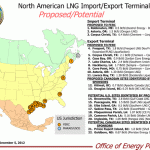Exporting Natural Gas Raises Hopes and Fears on the Texas Coast

Dave Fehling / StateImpact
Lavaca Bay in Calhoun County is one proposed site for an LNG Terminal.
If you think the price of natural gas is too low and think the solution is to increase demand by exporting the stuff, who will benefit?
“It’s going to make some people very rich but it’s going to hurt a lot of other people. Maybe a little, maybe a lot depending on who they work for and where they’re based,” says Craig Segall, an attorney at the Sierra Club’s legislative office in Washington.
The Sierra Club has registered its opposition to the one export terminal to so far win Federal approval, a project in Cameron Parish, Louisiana. The majority of the proposed or potential sites are along the Gulf Coast with a half dozen in Texas according to the Department of Energy.
Among the group’s concerns is whether regulators have fully considered how liquified natural gas (LNG) exports might further increase the drilling process called fracking.
“You’re looking at hundreds or thousands of new wells depending on how much gas you’re exporting. And you’re looking at a big spike in production,” Segall told StateImpact.”If we ultimately do make the choice that we should be gas exporters rather than exporters of finished goods or industrial products we better be pretty sure we can produce that gas safely. And we just aren’t there.”
But as Segall alluded, it’s not just fears of pollution but also of an impact on natural gas prices and what that might mean to the U.S. economy.
The Threat to Gulf Coast Jobs
As StateImpact covered in a post last week, some projections downplay the potential increase in prices and minimize the risk to the very thing low-priced natural gas has led to: Job growth along the Texas Gulf Coast.

Deloitte's Tom Choi
Petrochemical plants are spending billions expanding their operations. The plants are taking advantage of the cheap gas that will allow them to make products like plastics at a lower cost than competitors in Europe and Asia where natural gas is far more expensive.
“In our analysis we found the threat is really pretty minimal,” says Tom Choi, the top analyst for natural gas at Deloitte MarketPoint.”They probably will have to pay slightly more. But fears that it will make prices rise so much that they won’t be competitive on a global market are, I believe, unfounded.”
The Golden Egg Argument
To pull that off will take careful planning so as to not kill the goose that laid the golden egg of cheap natural gas says Joseph Pratt, an energy historian at the University of Houston.

Joseph Pratt at the University of Houston
“I like the golden egg argument,” Pratt said.
“Inexpensive shale gas (from fracking) could revolutionize American industry. I’d like to see if it would. And what these reports (on price impact) are telling me is that we can do it both ways,” Pratt told StateImpact. But only, he predicted, with “careful public policy” that would limit the amount of gas exported so there’ll still be enough at a low price domestically to “underwrite this industrial revolution in America.”

